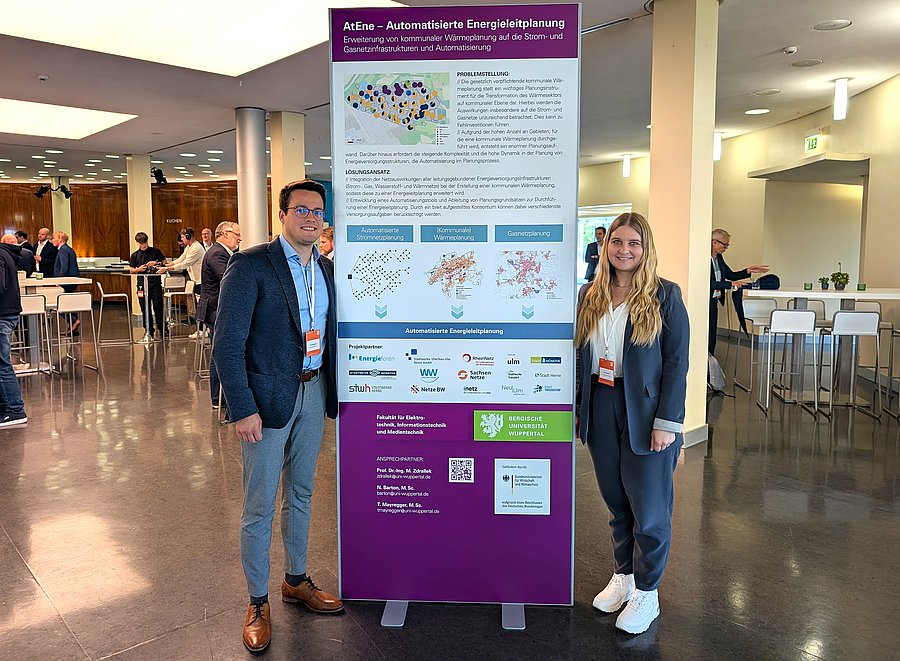Nomination
Software for the energy transition: Bergische Uni at the Electrifying Ideas Award

Timo Mayregger (left) and Nicole Barton are research assistants in the AtEne project and represented the university of Wuppertal at the Electrifying Ideas Award ceremony in Berlin // Photo BUW
With the Electrifying Ideas Award, the ZVEI honours innovations and solutions that take into account the efficient use of energy and resources and have a benefit for society. Among numerous submissions, the idea from the University of Wuppertal made it into the top three in the Newcomer category. Even though it was not enough to win the award in the end, the project team was given the opportunity to present the software and the project behind it to a wider audience in Berlin on Thursday (23 May).
More about the idea
Whether integrating renewable energies, converting the gas network to hydrogen or supplying e-cars and electricity-powered heat pumps - the municipal energy supply network is facing huge challenges. In order to accelerate the energy transition at a local level and make it cost-efficient, smart tools are needed to support the planning of the future energy infrastructure. Otherwise, there is a risk of permanent construction sites in the city and additional costs due to a lack of coordination processes.
Automated and cross-sectoral
The AtEne software, which is currently being developed in the research project of the same name at the University of Wuppertal, provides a solution: "AtEne offers automated and cross-sectoral energy master planning for municipalities, municipal utilities and distribution network operators that takes electricity, heating, hydrogen and natural gas networks into account," explains project manager Prof Markus Zdrallek, who heads the Chair of Electrical Energy Supply Technology at the University of Wuppertal.
The AtEne software increases planning efficiency for grid expansion by developing analysis tools that record and visualise grid effects, planned measures and investment costs. Ultimately, all consumers benefit from the potential savings identified for municipal utilities, grid operators and local authorities.
Assistance for all municipalities
One of the challenges to be overcome in the project: "The energy transition is different in every neighbourhood. We therefore need to be able to forecast individually how photovoltaic systems, charging points, refurbishments and the provision of heat will develop. The data basis always varies depending on the municipal utility, grid operator and municipality," explains energy expert Zdrallek.
For the best possible concept behind the application, the University of Wuppertal is therefore working together with ten grid operators and five municipalities in the AtEne project. They are providing data for research and testing as well as for implementing the software, which will also help other local authorities with planning in the future. Energieforen Leipzig GmbH is another research institute involved in the project, which is funded by the Federal Ministry for Economic Affairs and Energy (formerly Economy and Climate Protection). The project will run for a total of three years and is currently halfway through.
More background: ZVEI, eSummit and Electrifying Ideas Award
Together with its members from the electrical and digital industry, the ZVEI is pursuing the goal of "driving the transformation to an electrified and digitalised society a little further every day. Technologically, politically and socially."
As part of its eSummit, the association presented the Electrifying Ideas Award for the third time, with which it "goes in search of clever minds and their ideas that support our vision of an all-electric society and ignite the spark". This includes ideas that can advance society by having a positive impact on people's lives and for which it is not always the degree of maturity that is decisive, but the basic idea and its transformation potential.
The award was presented in two categories: "Established companies/organisations" and "Newcomers" - the latter also included applications from university projects.
This might also interest you
A reality check for the emergency power supply
Well prepared for the worst-case scenario: With ‘SiSKIN Applied’, the University of Wuppertal is launching a three-year research and development phase to strengthen the resilience of critical infrastructures to large-scale power outages. The aim of the project is to develop practical concepts for the automated planning and implementation of emergency power supplies in order to be able to coordinate the resupply of critical infrastructures in the event of a blackout.
